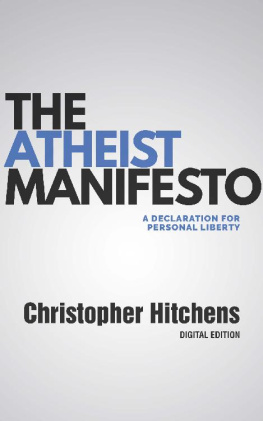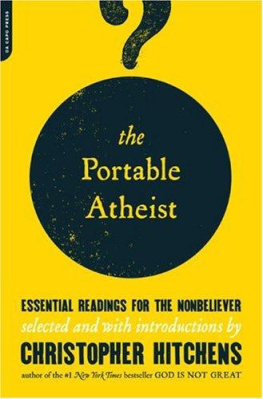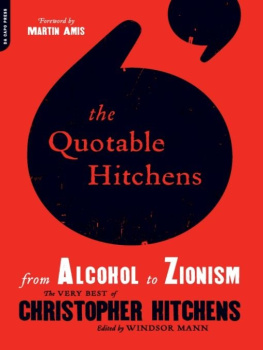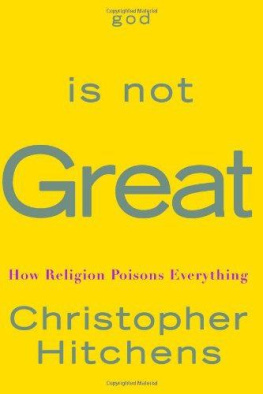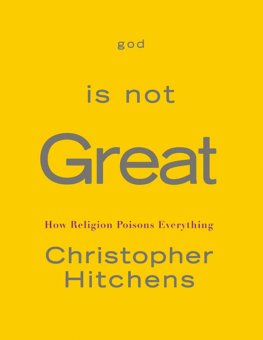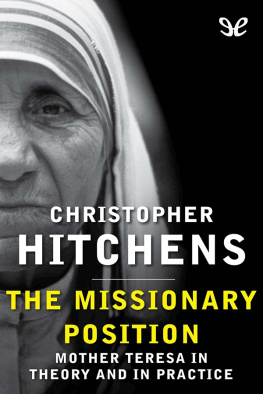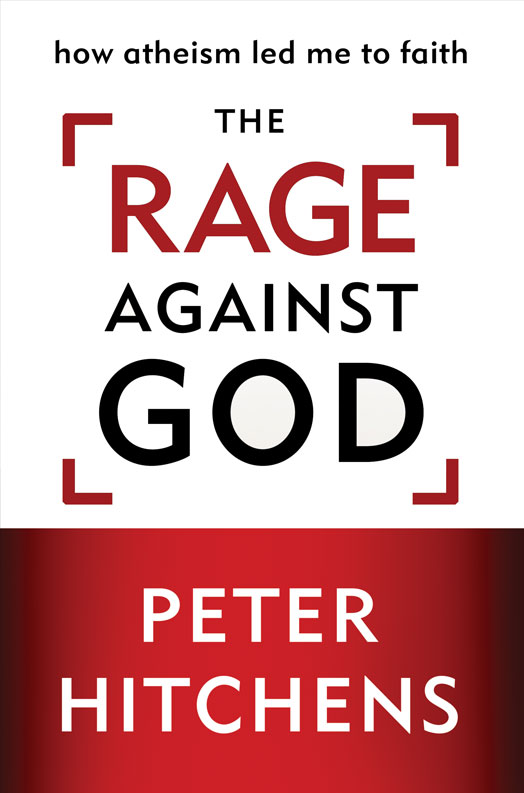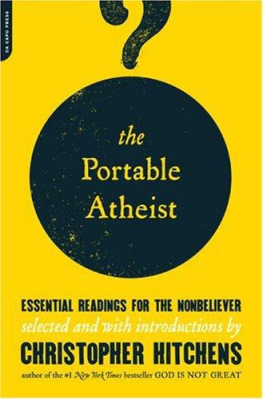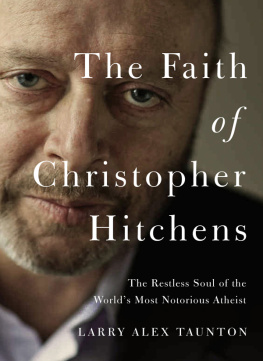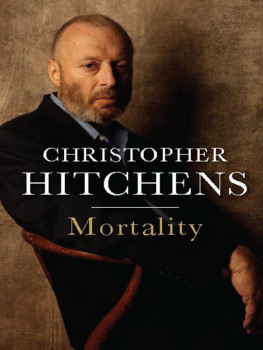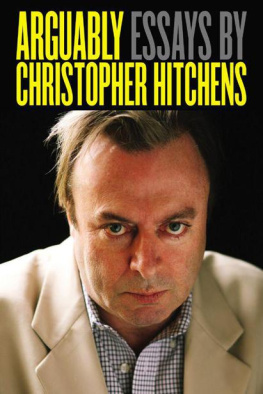Christopher Hitchens - The Atheist Manifesto: 2nd Edition
Here you can read online Christopher Hitchens - The Atheist Manifesto: 2nd Edition full text of the book (entire story) in english for free. Download pdf and epub, get meaning, cover and reviews about this ebook. year: 2016, genre: Religion. Description of the work, (preface) as well as reviews are available. Best literature library LitArk.com created for fans of good reading and offers a wide selection of genres:
Romance novel
Science fiction
Adventure
Detective
Science
History
Home and family
Prose
Art
Politics
Computer
Non-fiction
Religion
Business
Children
Humor
Choose a favorite category and find really read worthwhile books. Enjoy immersion in the world of imagination, feel the emotions of the characters or learn something new for yourself, make an fascinating discovery.
- Book:The Atheist Manifesto: 2nd Edition
- Author:
- Genre:
- Year:2016
- Rating:5 / 5
- Favourites:Add to favourites
- Your mark:
- 100
- 1
- 2
- 3
- 4
- 5
The Atheist Manifesto: 2nd Edition: summary, description and annotation
We offer to read an annotation, description, summary or preface (depends on what the author of the book "The Atheist Manifesto: 2nd Edition" wrote himself). If you haven't found the necessary information about the book — write in the comments, we will try to find it.
The Atheist Manifesto: 2nd Edition — read online for free the complete book (whole text) full work
Below is the text of the book, divided by pages. System saving the place of the last page read, allows you to conveniently read the book "The Atheist Manifesto: 2nd Edition" online for free, without having to search again every time where you left off. Put a bookmark, and you can go to the page where you finished reading at any time.
Font size:
Interval:
Bookmark:
Contents
I.
The Case Against Theism
I thought I'd begin by posing a sort of Rorschach-test question or two, from recent developments that will be familiar. Here's your moral Rorschach test.
On New Year's Eve a man aged 75 years old is having a sleepover with his five-year-old granddaughter. Suddenly, an axe is taken to the outside of his front door, which is successfully broken into by a man still wielding said axe and a knife. If the 75-year-old man hadn't had the presence of mind to get his granddaughter very quickly into a bathroom and lock it behind him, whereupon that door began to splinter as well, and actuate a panic call to the police, he and she would have been hacked to pieces as the last year turned.
I'm assuming you're of average moral character. What's your reaction when you hear about a thing like that? Do you think, there is such a thing as evil in the world? And that there are good people, and there are bad people. And the good people do good things, at least they do the best they can do. And the bad people seem to rather enjoy doing things that, in our worst nightmares we wouldn't want to do, or if we were found guilty of doing, would almost want to die. To hack a five-year-old girl into pieces in front of her grandfather before killing him; or maybe the grandfather in front of the little girl first.
Simple, you might think, as many moral questions essentially are. I read yesterday an article in the Guardian of London , probably one of the most famous liberal daily newspapers in the world, certainly in the English-speaking world. It was a long article by an academic saying, no, don't look at this picture like that. It's not a Rorschach test at all. What you need to understand is that this old man, grandfather to that girl, once drew a cartoon that very gravely upset some believers in a religion. I won't have to mention that religion to you, I don't have to identify it, but it was the religion professed by the man who thought New Year's Eve would be a good time to break in with an axe and try to kill them both.
Surely, the fault here is with the man who drew those cartoons. If he hadn't done that, this crime wouldn't have occurred. Just revolve this thought in your mind for a second. It's not the only instance I have for you.
Not very long ago in a United States Army Base in the state of Texas, a man who'd taken the Hippocratic oath, a physician-in-training, unshipped his weapon. Actually a private weapon he'd bought off the base. With it, he sprayed people who were waiting for a medical examination with lethal fire, killing them in some number, after having shouted a very well-known religious slogan. There's no need to mention which monotheism he was affiliated with.
Actually, I get ahead of myself when I say he shouted a slogan. What if he hadn't? What if he had not? What if he had kept quiet about his faith? Would the president of the United States have said, and The New York Times have said, and CNN have said this appears to be something that's too early to pass judgment upon. Let's not rush to a conclusion. Let's consider the influence of post in fact, in this man's case, pre traumatic stress disorder, since he didn't actually experienced any warfare yet, but was ostensibly helping other caregivers to help people who do suffer from it.
No, I don't think that if you left out the religious question anyone would have found any reason to euphemize, to otherwise characterize, to relativize, to try and minimize, to diminish the full effect of the atrocity that was confronted right in front of our eyes.
I have a couple of other examples of this sort, but I have a feeling that you know what I mean. It's not for its own innate interest alone that I mention these examples. It's for this reason. I must have debated now in several hundred religious venues as the guest of every kind of religious institution, university, private group, public church. I'm always confronted with the argument that without a belief in a one God and a creator and a religiously dictated code of ethics and morals, I myself would not know right from wrong. Without heavenly authority I could not know right from wrong. Without the mandate and warrant that comes from a celestial dictatorship a sort of North Korea with more clouds and a Dear Leader and a Great Leader, just one short of a trinity. But at least you can die and leave North Korea, whereas when you die with the faithful, that's when the fun really begins. But I actually almost deliberately digress.
The idea is that I, born in roughly the same way as you were, with roughly the same morally innate instincts, wouldn't be able to trust them. That I would not be able to guess myself what was right from wrong. I would be sunk in a mere swamp of modernism, relativism, and hedonism. I would have no true north to which my compass could turn without the divine to know what was a wicked or iniquitous action.
I return you now to the two examples that I was able to pick easily just from today's headlines, and say to you, who is relativizing evil here? Who is making the excuses? Who is saying that for people of faith you must make allowances for the horrific crimes they commit, and the terrible cruelty that they advance?
Who here is being, if you like, soft on crime? Is it not, in fact, the reverse? It is not without God that all is possible as Dostoyevsky once rather brilliantly put it in The Brothers Karamazov but it is with God that someone who feels that once they're on a divine mission anything is permitted to them, and of course to nobody else. What is this but the most abject, slimy, euphemistic, obviously man-made moral relativism?
So to the main point that my antagonists make against me, I have at least in opening, this reply. And I urge you to try and keep it in mind the next time you hear it yourself. How dare people who issue warrants for murder and torture of other humans say that without God people would behave worse?
I have evolved an equally simple question relative to that same challenge. I've replied to it with a charge of my own. I'd like to meet, and I haven't yet met in all these debates, a spokesman for faith who will say to me: here is the moral statement made, or moral ethical action undertaken by a believer that you, Hitchens, or one of your co-thinkers, couldn't as an unbeliever make. You couldn't duplicate it.
I've never yet had a reply to it. I have, in thought experiments, thought of one such example and, if you press me very hard in the question time, I'll tell you what it is. But it doesn't solve the problem of relativism.
That challenge, which I've now issued to quite senior theologians and men of God in holy orders, I've not yet had a reply. And I consider it significant that an amateur like myself can defeat professionals of that sort with such an obvious question. But remember, religion is supposed to be for the humble, for the simple. It's supposed to be obvious. It's supposed to be morally self-evident so as to be a matter of faith. If I can baffle them like that, how good is their casuistry and sophistication?
Pressing on and getting a bit cruder, I have a corollary to my challenge, which is: can you think of an evil action performed by a religious person, or wicked statement made because of their faith? And everyone immediately has thought of one. And if you think again for a second, you'll be able to think of another. The suicide murder community is more or less exclusively faith-based. Not entirely, I won't say that; but more or less exclusively faith-based. The genital mutilation community, I regret to tell, you is faith-based by definition. The child abuse community. It's not said that there's a sin, an iniquitous one, one that most of us really would rather die than even be suspected of, that is of course part of the proof that we are not all made in the image of God, but that we are in fact a poorly evolved primate species. We're capable of appalling cruelty to our offspring. But it's very rare that such a thing is institutionalized over generations, and made into something where senior prelates of a church that believes in mortal sin and undying punishment will regularly subject themselves and protect their colleagues from the consequences of a vileness that is almost unimaginable. It proves to me they can't really mean what they say.
Font size:
Interval:
Bookmark:
Similar books «The Atheist Manifesto: 2nd Edition»
Look at similar books to The Atheist Manifesto: 2nd Edition. We have selected literature similar in name and meaning in the hope of providing readers with more options to find new, interesting, not yet read works.
Discussion, reviews of the book The Atheist Manifesto: 2nd Edition and just readers' own opinions. Leave your comments, write what you think about the work, its meaning or the main characters. Specify what exactly you liked and what you didn't like, and why you think so.

